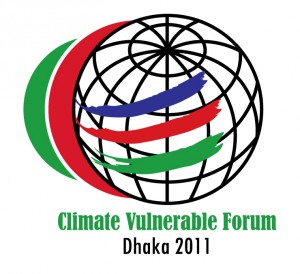November 13, 2011
Statement of the People’s Republic of China as Observer during the Common Space session of the Climate Vulnerable Forum, 13 November 2011

At the outset, please allow me to express, on behalf of the Chinese Government, warm congratulations on the successful opening of the Climate Vulnerable Forum in Dhaka!
Climate is the natural environment which mankind depends on for living and the important basic resources for sustainable economic and social development.
Climate change is a major challenge the world faces today. It is our common task to curb climate change and save our homeland. In two weeks time, the UN Climate Change conference will be held in Durban, South Africa. At this critical moment, the Climate Vulnerable Forum meeting certainly carries significant impact on consolidating international cooperation on climate change and safeguarding the common interests of developing countries. Here I would like to share with you some of our observations.
 Firstly, the Durban conference should achieve comprehensive, balanced and pragmatic results. The main goal of the conference should be to maintain the dual-track negotiation mechanism on UNFCCC and Kyoto Protocol, and make positive progress in related areas with the guidance of the Bali Road Map. The result of the Durban Conference should follow the dual-track negotiation mechanism and fully represent the consensus of the Cancún Agreement. We should specify the emission reduction credits in the second commitment period for the developed parties; we should specify a comparable emission-cutting commitment for developed non-contracting parties; we should ascertain a mechanism arrangement for adaption, funds, technology transfer, and capability building, and create a mechanism of adaptation that effectively supports developing countries on funds and technology transfer. Also, we should specify the arrangement of ”measurable, reportable, verifiable” and “transparency.” Only with all these factors can the developing countries implement certain voluntary mitigation actions based on the principle of a “common but differentiated responsibility.”
Firstly, the Durban conference should achieve comprehensive, balanced and pragmatic results. The main goal of the conference should be to maintain the dual-track negotiation mechanism on UNFCCC and Kyoto Protocol, and make positive progress in related areas with the guidance of the Bali Road Map. The result of the Durban Conference should follow the dual-track negotiation mechanism and fully represent the consensus of the Cancún Agreement. We should specify the emission reduction credits in the second commitment period for the developed parties; we should specify a comparable emission-cutting commitment for developed non-contracting parties; we should ascertain a mechanism arrangement for adaption, funds, technology transfer, and capability building, and create a mechanism of adaptation that effectively supports developing countries on funds and technology transfer. Also, we should specify the arrangement of ”measurable, reportable, verifiable” and “transparency.” Only with all these factors can the developing countries implement certain voluntary mitigation actions based on the principle of a “common but differentiated responsibility.”
The UNFCCC and the Kyoto Protocol are the basic framework and legal basis for the international community to work together against climate change. The second commitment period of the Kyoto Protocol is the key issue for the Durban Conference to make progress with the guidance of the Bali Road Map. The second commitment period must be adhered to. Developed countries should face their historic responsibilities and obligations, increase the standard of emission-cutting commitment and bear the duty for large-scale emission cuts during the second commitment period. Developed non-contracting parties of the Protocol should also bear an emission-cutting credit that is comparable to the developed contracting parties over scale, property, and compliance mechanism. Developed countries should provide funds, technology transfer, and capability building for developing countries. Only on the basis of all these can developing countries take nationally appropriate mitigation actions.
“China would like to carry out pragmatic cooperation with CVF members on coping with climate change and a bilateral framework, and provide our help and support within our capabilities by means of South-South cooperation.“
Secondly, we should make overall arrangements for adaptation to and mitigation of climate change as both factors are important aspects for coping with climate change. Adaptation to climate change is the most pressing task that developing countries face and we should make positive progress in this area during Durban.
Developing countries bear no responsibilities for climate change today. However, they are the most vulnerable to climate change and have become its victim. Developed countries should fulfil the obligations stipulated in the Protocol, provide assistance in funds, technology, and capability building, and help all developing countries, especially climate vulnerable countries to cope with climate change. As a victim of climate change, China understands the concerns pertaining to adaptation of climate vulnerable countries and supports their reasonable claim on adaptation.
Thirdly, developed countries should provide large-scale new, extra, and predictable funds for tackling climate change. The funds should mainly come from public funds and funds from carbon market and private sectors can be used as a supplement. China holds that the funds be provided to Small Island Countries, Least Developed Countries, and African countries on a priority basis.
Fourthly, CVF members are mostly small island countries, Least Leveloped Countries and African countries. Like many CVF members present here today, China faces the same threat from climate change and fully understands the feeling of climate vulnerable countries. China would like to further strengthen the dialogue of communication about climate change with climate vulnerable countries, improve our understanding, broaden our consensus, and consolidate our solidarity, so as to protect the overall interest of developing countries and play a constructive role on climate change negotiations. China would also like to carry out pragmatic cooperation with members of the CVF on coping with climate change and a bilateral framework, and provide our help and support within our capabilities by means of South-South cooperation.
The Chinese government will, as always, work together with all countries, including CVF members and make concerted efforts in effectively coping with climate change and achieving sustainable development of mankind.
See the latest updates from the Climate Vulnerable Forum 2011 in Dhaka
Share this